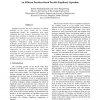375 search results - page 24 / 75 » On ranking techniques for desktop search |
COLING
2010
14 years 4 months ago
2010
Precision-oriented search results such as those typically returned by the major search engines are vulnerable to issues of polysemy. When the same term refers to different things,...
ICPADS
2005
IEEE
15 years 3 months ago
2005
IEEE
PageRank becomes the most well-known re-ranking technique of the search results. By its iterative computational nature, the computation takes much computing time and resource. Res...
165
Voted
ICDE
2009
IEEE
15 years 11 months ago
2009
IEEE
A previously proposed Keyword Search paradigm produces, as a query result, a ranked list of Object Summaries (OSs); each OS summarizes all data held in a relational database about ...
VLDB
2004
ACM
15 years 3 months ago
2004
ACM
Web spam pages use various techniques to achieve higher-than-deserved rankings in a search engine’s results. While human experts can identify spam, it is too expensive to manual...
AIRWEB
2007
Springer
15 years 3 months ago
2007
Springer
Nowadays web spamming has emerged to take the economic advantage of high search rankings and threatened the accuracy and fairness of those rankings. Understanding spamming techniq...

